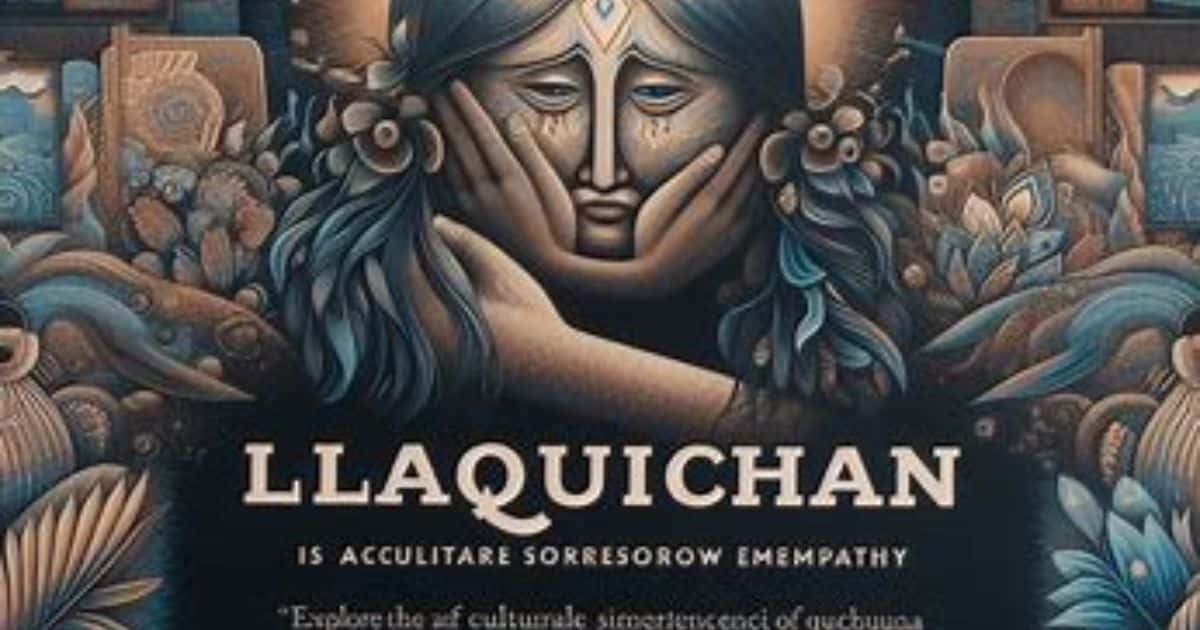Introduction
Llaquichan is a captivating time period rooted within the rich cultural historical past of the Andean regions, specially the various Quechua-speaking groups. This article ambitions to delve deep into the which means, importance, and cultural importance of Llaquichan, losing mild on its numerous dimensions and cutting-edge relevance.
Etymology and Linguistic Roots
The term “Llaquichan” originates from the Quechua language, one of the oldest and maximum widely spoken indigenous languages in South America. The Quechua phrase “llaki” interprets to sorrow or unhappiness, at the same time as “chan” is a suffix that often denotes a diminutive or endearment. Hence, Llaqui chan may be interpreted as “little sorrow” or “liked sorrow.”
Cultural Significance
Llaqui chan is extra than only a phrase; it embodies a complicated emotional and cultural concept. In Quechua way of life, it represents a nuanced information of sorrow that is intertwined with love, empathy, and network team spirit.
1. Emotional Resonance:
Llaquichan encapsulates a type of sorrow this is gentle and nearly cherished. It acknowledges the presence of ache however also acknowledges the beauty and depth it brings to the human enjoy.
2. Community and Empathy:
In Quechua communities, expressing Llaqui chan may be a manner to reveal empathy and cohesion with someone’s suffering. It’s a shared emotional experience that strengthens network bonds.
Llaquichan in Literature and Art
The idea of Llaquichan has determined expression in numerous types of Andean literature and art. It is regularly depicted in poetry, songs, and visible arts, where the subject matters of sorrow and beauty are interwoven.
1. Poetry:
Quechua poets often use Llaqui chan to evoke a deep emotional response from their audience. It serves as a powerful tool to convey the complexities of human emotions.
2. Music:
Traditional Andean music frequently incorporates themes of Llaquichan, using melancholic melodies to express the bittersweet nature of sorrow.
3. Visual Arts:
Artists might depict scenes of everyday life infused with a sense of Llaqui chan, highlighting the resilience and emotional depth of the Andean people.
Contemporary Relevance
In today’s world, the concept of Llaquichan continues to hold relevance, especially as people navigate the complexities of modern life.
1. Mental Health:
Understanding and embracing Llaqui chan can offer a unique perspective on dealing with sadness and grief. It encourages individuals to see sorrow as a part of the human experience that can lead to personal growth.
2. Cultural Identity:
For Quechua-speaking communities and the broader Andean population, Llaquichan remains a vital part of their cultural identity. It serves as a reminder of their rich heritage and emotional resilience.
3. Cross-Cultural Appreciation:
As globalization brings different cultures closer, concepts like Llaqui chan offer valuable insights into alternative ways of understanding and expressing emotions. It promotes cross-cultural empathy and appreciation.
The Role of Llaquichan in Social Rituals
Llaquichan is often an integral part of social rituals and ceremonies in Quechua culture. These practices underscore the community’s collective handling of grief and sorrow.
1. Funerals and Mourning:
During funerals, Llaqui chan is openly expressed through mourning rituals. The community comes together to support the bereaved, sharing in their sorrow and offering comfort.
2. Festivals and Commemorations:
Even in festivals, elements of Llaquichan can be observed. It serves as a reminder of the cycles of joy and sorrow in life, acknowledging the presence of both in communal celebrations.
Psychological Insights
From a psychological perspective, Llaqui chan offers a profound understanding of how people process and cope with sorrow.
1. Acceptance and Healing:
Embracing Llaquichan allows individuals to accept their sorrow rather than suppress it. This acceptance can be a crucial step towards healing.
2. Emotional Resilience:
Recognizing sorrow as a shared human experience fosters emotional resilience. It helps individuals to cope better with personal and collective grief.
Comparison with Other Cultural Concepts
Llaqui chan can be compared with other cultural concepts of sorrow and empathy, highlighting both unique and universal aspects of human emotions.
1. Japanese Mono no Aware:
Similar to Llaquichan, Mono no Aware in Japanese culture refers to the bittersweet awareness of the impermanence of things, blending sorrow with appreciation.
2. Portuguese Saudade:
Saudade is a deep emotional state of nostalgic longing, often for something or someone that is absent. Like Llaqui chan, it blends sorrow with affection.
Preserving Llaquichan in Modern Times
As modernity and globalization influence traditional cultures, there are efforts to preserve the concept of Llaquichan.
1. Educational Initiatives:
Teaching the younger generation about Llaqui chan through cultural education ensures its preservation and continuity.
2. Cultural Documentation:
Recording and documenting expressions of Llaquichan in literature, music, and art helps keep the concept alive for future generations.
Conclusion
Llaquichan is a deeply ingrained cultural concept that offers a unique angle on sorrow and empathy. It reflects the rich emotional tapestry of Quechua tradition, highlighting the splendor discovered in shared human reviews of sorrow and resilience. Understanding Llaqui chan can foster extra empathy and appreciation throughout specific cultures, reminding us of the universal threads that bind humanity collectively.

